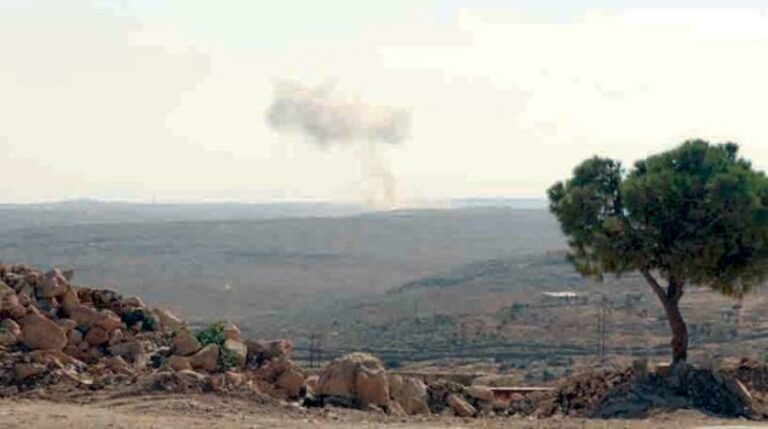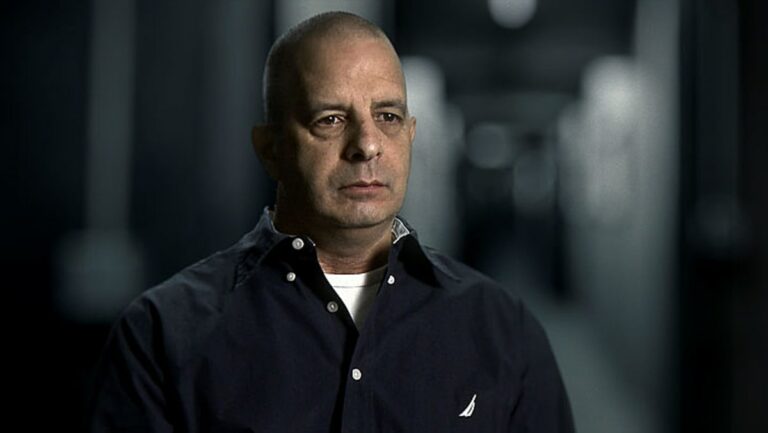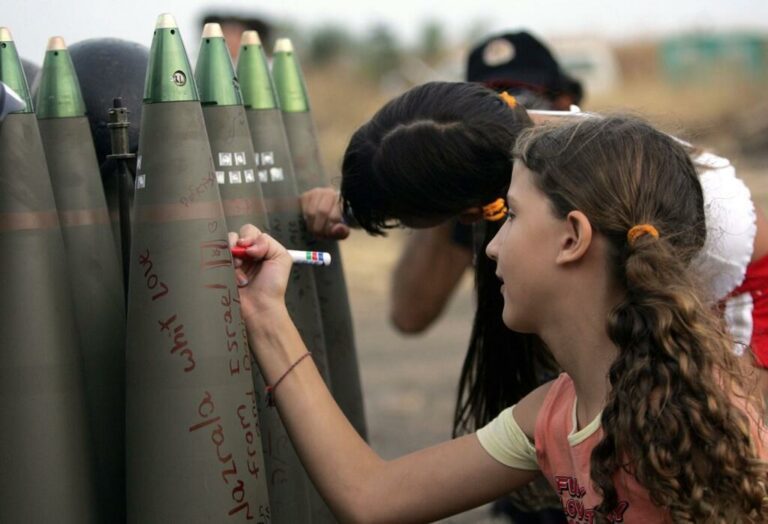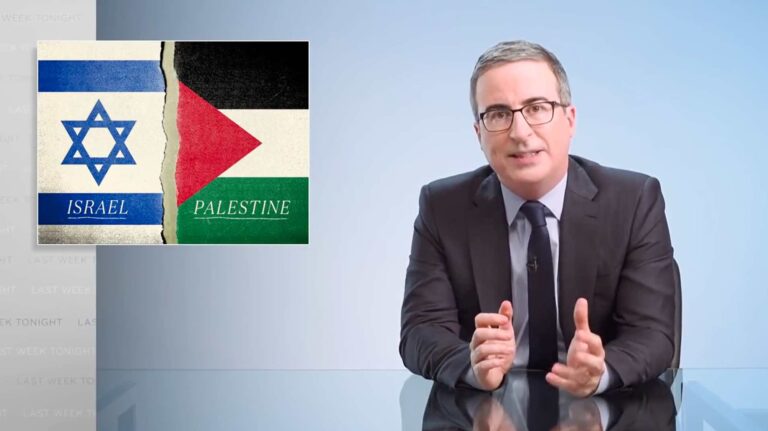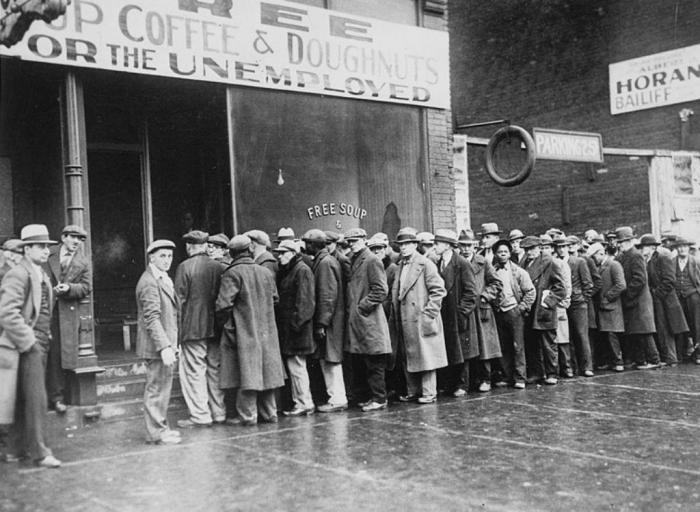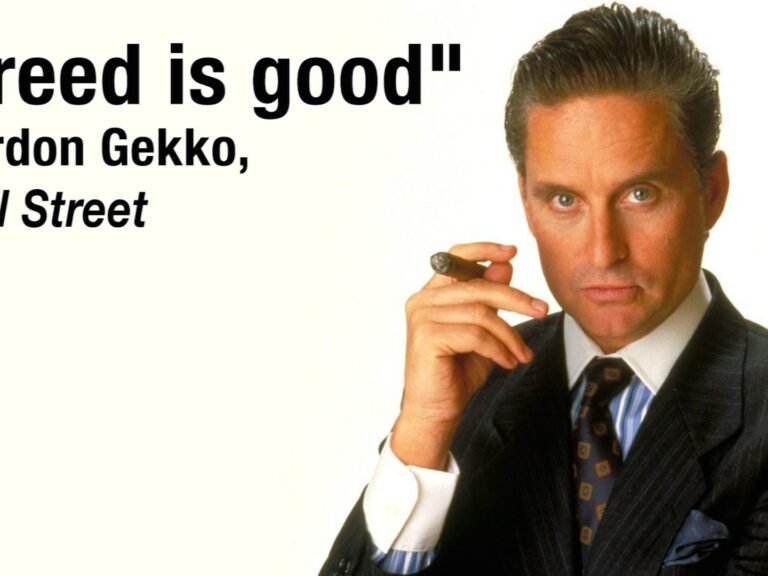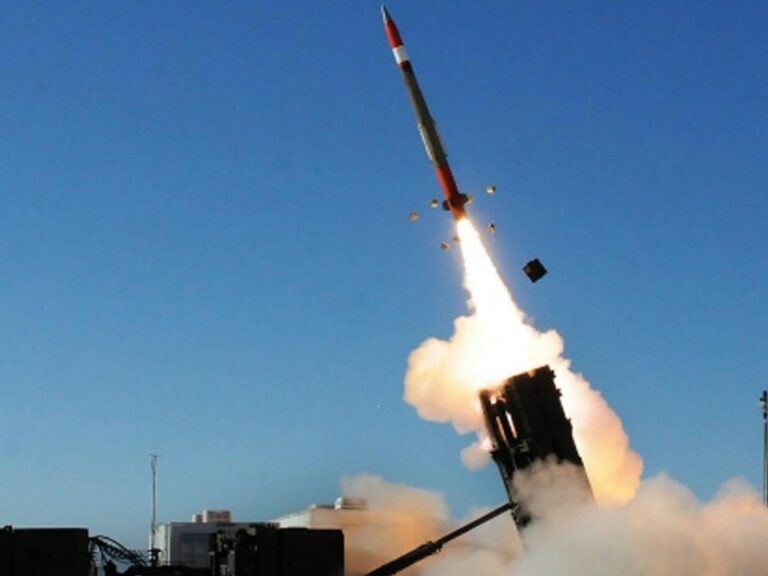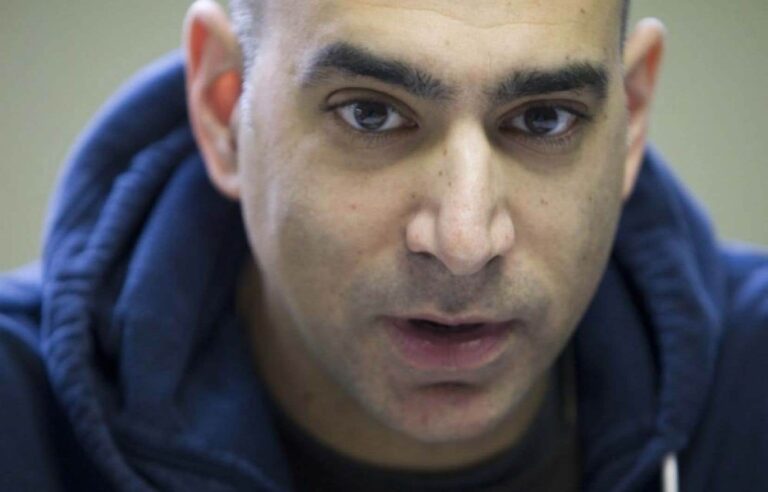On RAI with Paul Jay, Phyllis Bennis traces her development from active Zionist youth to whom Jewish identity meant support for Israel, to a leading American anti-Zionist writer and analyst. This is an episode of Reality Asserts Itself, produced December 10, 2013, with Paul Jay.
TRANSCRIPT
PAUL JAY, SENIOR EDITOR, TRNN: Welcome to The Real News Network. I’m Paul Jay in Baltimore. And welcome to Reality Asserts Itself.
The situation in the Middle East is getting tenser. At the same time, it looks like there might be some breakthroughs and resolution on things–the negotiations with Iran, the situation in Syria. But of course there are many forces at play here that might blow all of this up in the air.
Now joining us to talk about all of this is Phyllis Bennis. Phyllis is the director of the New Internationalism Project at the Institute for Policy Studies. She’s been a writer and analyst and activist on the Middle East and UN issues for many years. Two thousand and one, she helped found the U.S. campaign to end the Israeli occupation. She cochairs the UN-based International Coordinating Network on Palestine. She continues to serve as an adviser to several top UN officials on the Middle East. And she’s in the running for the UN special rapporteur on human rights in the occupied territories.
Phyllis is the author of many books, including Calling the Shots: How Washington Dominates Today’s UN, Before & After: U.S. Foreign Policy and the September 11th Crisis, Challenging Empire: How People, Governments, and the UN Defy U.S. Power. And she’s done four primers, as she says (but I said primers): Understanding the Palestinian-Israeli Conflict, Ending the Iraq War, Understanding U.S.-Iran Crisis, and Ending the U.S. War in Afghanistan.
Thanks very much for joining us, Phyllis.
PHYLLIS BENNIS, FELLOW, INSTITUTE FOR POLICY STUDIES: Great to be with you, Paul. I’m glad to be in Baltimore.
JAY: So, as people that watch Reality Asserts Itself know, we usually start these series with a personal background of our guest, get to know a little bit about why they think what they think, and then we’ll move more into current issues and what they think.
So, Phyllis, let’s kind of go back. Just give us a sense of the kind of politics in your household when you grow up, in terms of your parents, the culture, the influence. What is it?
BENNIS: You know, I grew up with a very traditional, Reform Jewish, Democratic Party family. Nobody was an activist.
JAY: Where?
BENNIS: West Los Angeles. I grew up in California. Don’t I come off like a California girl?
JAY: Yes.
BENNIS: And for me the idea of activism around the big issues of the time, which included the–you know, I grew up in–I was born during the McCarthy period, the anticommunist surge of the ’50s, and then, of course, the–.
JAY: And a great focus on it in L.A.
BENNIS: Absolutely, and a great period of the civil rights movement.
But until maybe high school, those things didn’t touch me very much. I was very involved in the Zionist movement. I was a very active Zionist youth group organizer, camp counselor, camp director, all that stuff. I learned a lot about organizing, actually, in those days.
JAY: So Jewish identity was a big part of your identity.
BENNIS: Jewish identity was a huge part of my identity, although it’s interesting that unlike friends of mine who grew up in the same period, say, in Long Island or in New York, or elsewhere, in California for Reform Jews the religious part was not very important. You know, God really never never entered into the equation. It was all about Israel. This was all about Israel.
JAY: And so this is–your father and mother are imbued in this.
BENNIS: Both my parents were very involved. Both of them were Sunday school teachers at our temple. My father was active on the temple board for many, many years. My mother used to tell me later that from the time I was about two, she would take me to the Sunday school and drop me off in the first-grade class so she could go teach her own class and that they used it as a babysitter. So I was imbued in all that stuff.
JAY: And Israel is what to you? I mean, I assume as a kid you weren’t there, were you?
BENNIS: No. No. We couldn’t afford to go.
JAY: So what is this image in your mind of what Israel was?
BENNIS: The image in my mind was very much the Golda Meir version of making the desert bloom and there are no Palestinians. This was not the kind of cutthroat Zionism where you talk about the Palestinians, you talk about expelling them, you talk about the need to establish an iron wall. It wasn’t any of that. For us, Palestinians didn’t exist. They were simply not in the equation. They certainly weren’t on the land. As I got older, junior high, high school, started–left ideas started creeping in, the question of the civil rights movement was emerging, socialism was starting to be a word I would hear, and in that context, Israel was very much about all of that. The kibbutz movement was a huge component of what I–.
JAY: And how much was the Holocaust and World War II–I mean, you’re not that, actually, far away. I know when I grew up in the same period, we were actually singing children’s songs, you know, ridiculing Mussolini and Hitler. We weren’t that far away from the war.
BENNIS: I didn’t grow up with any of that.
JAY: Maybe I’m older than you are.
BENNIS: Maybe a little bit older–not too much, probably. I didn’t grow up with any of that. My father, of course, had fought in World War II, but like so many of that generation, he came home, put away his uniform, and never talked about what he did in the war until much later.
JAY: But is–you know, flowers bloom in Israel and reclaiming the desert and all these sort of positive stories. But is it also about Jews need Israel because they’re going to come get us again?
BENNIS: Not really. That’s what, when I think about it, is a little odd. I mean, I read the novel Exodus over and over again as a kid when it came out, and I saw the movie, and, of course, we were all enamored of Paul Newman as the handsome Ari Ben Canaan. You know. So that played a big part. And, of course, the Holocaust shaped that novel in terms of the legitimacy of the creation of the state of Israel.
But in terms of my life, I didn’t hear about that. My relatives had left Europe before the Holocaust. My grandfather had come from Russia escaping pogroms in 1910, but my other grandparents were already here. They were born in–three of my four grandparents were born in New York. So we didn’t have family in the Holocaust. I didn’t have that personal connection. And it was more about Jewish identity. It was very much old-fashioned identity politics more than anything else. So that was my identity. I was very proud of it.
JAY: So I would guess people that watch The Real News know this already, but Phyllis is probably, if not the, one of the most outspoken, articulate critics of Zionism amongst North American Jews. So how do you get from there to there, here from there to here?
BENNIS: Well, the short answer is the Vietnam War. You know. I grew right through high school with this focus on Zionism, and that was my social environment, those were my friends, that’s who I hung out with. And then I went away to college. And I start college in 1968, the big year, if you will. And in that context I spent my first year being very much a serious student. You know, this–you do grow up with, as a Jewish kid–and you probably did too–that it’s all about education, it’s all about, you know, getting good grades. That’s all the levels of expectation.
JAY: I grew up with that. I just didn’t listen to any of it and quit school the moment I could.
BENNIS: Well, there’s that. So here I am, a 17-year-old kid, you know, showing off, linking up with a group of graduate students, and going to–taking their courses, taking their postdoctoral seminars, and thinking of myself as quite the intellectual. But by the end of my freshman year, I’m suddenly immersed in the student movement antiwar stuff. The Black Student Union had taken over the computer center the year before in the struggle to get an ethnic studies department on campus.
JAY: You go to school where?
BENNIS: I’m at the University of California in Santa Barbara. And, you know, suddenly I’m joining SDS. I’m part of the new student government. We have an alliance with the Latino student movement and the Black Student Union, and we take over student government.
And suddenly I’m the chair of the Lectures Committee. You know, what the hell is that? I didn’t really know. But I had a budget of $10,000, which at that time was really a lot of money, to bring people to campus. So I brought Angela Davis and I brought half the defendants of the Chicago Conspiracy Trial and the lawyers from the trial. And suddenly I was involved with meeting all these people that I had only just heard about.
And school suddenly was not really about going to classes. None of us went to class very much. We were publishing an underground newspaper and we were doing radio. We took over the campus radio station.
JAY: Well, all this time, all the people that you’re associating with are supporting the Palestinian cause. It’s well known. It’s not like this is not a–it’s on the margins.
BENNIS: Yes and no.
JAY: Palestine was an important issue then.
BENNIS: At my university there was one Palestinian student who I knew. I’m sure there were more, but I didn’t know them. And he was kind of an interesting guy. I didn’t know him very well, but he was sort of around our circles, and I learned some things from him.
But I really didn’t think about the Middle East at all. I sort of put the whole question of the Middle East away when I got involved in work around the war. I just wasn’t thinking about it. I was studying imperialism, I studied the legacy of colonialism, and was completely invested in ending this war in Vietnam, the invasion of Cambodia that led to the explosion on college campuses. We had the National Guard on campus, and a student was killed. And the bank burned down, the Bank of America was burned down. You know, our campus was on the map as a center of all of this.
JAY: But getting to your school, your identity is a big piece of it, is Jewish identity and Israel, and that’s, like, on the other side of the barricade.
BENNIS: Right. But I really wasn’t thinking about it at that time. There was no activity on my college campus.
So then, you know, everybody on campus who’s politically active is focused on Vietnam. Nobody is talking about Palestine, Israel, nothing like that.
Suddenly, about two or three years later–and this is–we’re really talking about after I’m out of college now.
JAY: It’s what? Seventy-one? Seventy-two?
BENNIS: No, this is now ’73, ’74. Something happened, and to this day I don’t really remember. It might have been the ’73 War. I really don’t remember what it was. But something–.
JAY: But ’67 [crosstalk]
BENNIS: Sixty-seven, I was a kid in high school. Sixty-seven, I was running around, raising money for the war effort. I was at the Hollywood Bowl with a bucket, one of the legion of Jewish kids that were running up and down the steps of Hollywood Bowl collecting the checks from people that were there for this ten hour marathon. But then–.
JAY: But the narrative of a besieged Israel was totally part of what you believed in the world–
BENNIS: Yeah,–
JAY: –at that time.
BENNIS: –but not–I didn’t really get it. I didn’t even really think it was besieged. I just thought it was this was about defending Israel. That was a good thing. That was it. And this was my social life. I was a kid.
And then something happened. Whether it was the war in ’73 or something else around that time, something happens that shoves it back in my face and says, you’ve got to think about this again. And by then I’ve been studying imperialism, I’ve been studying colonialism. And I thought to myself, you know, I think I was wrong about this Israel stuff.
And being a good Jewish girl and a good intellectual, I go to my father’s library and I read Hertzl, the founder of modern Zionism. A read his diaries. And in his diary, Hertzl writes about his desperate effort that goes on for years to get support for what he calls his colonial project from Cecil Rhodes, for whom Rhodesia was named. And he writes these letters, these desperate letters to Cecil Rhodes, saying, I know that you’re interested in Africa and I’m interested in a little sliver of Arabia, but both of these are colonial projects. That’s his language. Both of these are colonial projects. You should support my efforts to get the British government to endorse my colonial project the way they have endorsed yours.
JAY: Okay. Very quickly, for younger viewers, who the name Rhodes and maybe even Rhodesia doesn’t mean anything, this is the theory of establishing essentially white settler states in Africa, and even in other places.
BENNIS: And, of course, the country that was called Rhodesia for so many years is today Zimbabwe. And Cecil Rhodes was the British colonial officer who led that colonial takeover of half of southern Africa.
So it was in that context, when I read that, because, of course, I had studied African decolonization, you know, I was reading Nyerere, and I read this and said, oh my God, what was I thinking? This guy was a lunatic. I was completely off base here. That’s over. And that was that. It was a very–no muss, no fuss. It was very quick.
Now, why didn’t I get all emotional and whatever about it? I don’t know, but I didn’t.
JAY: But it can’t be completely no muss, no fuss, ’cause you’ve got to go back and talk to your parents.
BENNIS: Well, but I didn’t talk to my parents about that for a long time. First of all, I didn’t start doing any work around it for quite a long time. The fact that I changed my mind didn’t change what I was doing. I got out of school. I went and worked for two years with the Indochina Peace Campaign with Tom Hayden and Jane Fonda. I went from there to New York for a year to work as a staff organizer in the National Lawyers Guild office. I was doing all kinds of international work there. I was doing work on Vietnam. I was doing work on the Southern Cone of Latin America, where the military dictatorships were rising and were carrying out these dirty wars. You know. So all of that was underway. I was starting to get involved a little bit in the emerging anti-apartheid movement. But I wasn’t doing anything around Palestine.
JAY: But you know that you’re detaching from what your father believed in the world.
BENNIS: Yes.
JAY: Even earlier, even your antiwar activism, you are for McCarthy. He votes for Humphrey.
BENNIS: Exactly. I was a “Clean for Gene McCarthy” kid, and my father was for Humphrey. And the only fight that I really remember was over that question.
I mean, but to their credit, when I think now about my parents, their willingness to accept the legitimacy of my changing ideas and not try to force me into their mold was really rather extraordinary. Now, some of it I know was because my parents never got to go to college. You know, they had to work. My father had scraped by. And his father had had a malt shop and then a candy shop in New Jersey, had barely been able to make it, had, you know, three boys that he had to raise, my father and his twin and then a younger one. The younger one, when he got out of the war, was he able to use the GI Bill and go to university. And he became a major academic figure, who still is a professor emeritus at the University of Southern California. But my father and his twin, they were married by the time they came back for the war. They couldn’t go off on the GI Bill. They went to work. They never got to go to school.
JAY: What city are you in at this point?
BENNIS: I’m only 100 miles away. I’m in Santa Barbara, California.
JAY: Still, throughout the ’70s.
BENNIS: No, no. This was only college.
JAY: Okay. When do you leave college?
BENNIS: Then I go back to L.A. for two years.
JAY: Well, let me jump to the content, and then give me the narrative in terms of time. When do you get to this position that you would call really anti-Zionist? But, I mean, being anti-Zionist, to me that means if its 1948 and I have a vote, which I wouldn’t have, I would have voted no. If you’re anti-Zionist, you don’t vote to establish an Israeli state.
BENNIS: Right. You–. And what’s ironic is that until the Holocaust, one of the things that I think is not very well known is that Jewish public opinion never accepted Zionism as a majority position until after the Holocaust. And if you think about it, it’s quite understandable why. You have a scenario of, say, the pogroms in Eastern Europe and in Russia, czarist Russia, and what does that look like? You have these anti-Semitic riders, you know, riding horses into town, burning down buildings, raping women, killing people, and in the name of cleansing Jews from their town, from their city, from their region, from their country. And immediately on their heels, you have Zionist organizers coming and saying, you’re not really Polish, you’re not really Russian, you’re really Jews, you’re something else, and you should come with us, leave your land where your family has lived for 500 years, leave that and come with us to establish this new state in the desert in Arabia. And people were like, what? Why would we do that? You fight against antisemitism here; we find allies here.
And so in that context Zionism was never the dominant position of how to fight against antisemitism. It was only in the context of the Holocaust and the post-Holocaust reality that antisemitism in the United States and Britain, along with anticommunism, prevented the vast majority of Jews who had either escaped the Holocaust, had survived the camps, and were now in displaced person camps all over Europe and wanted to go to join their families in Brooklyn or in Londons–they didn’t mostly want to go to Palestine, but that was the only option.
JAY: And a big part of that was in fact the many leaders of the Zionist movement actually lobbying Congress and the president, Truman, not to let Jews in. There’s a quote from Truman where Truman says, I don’t understand these Jews; I’m willing to stick my neck out, and I don’t even–there’s a great quote where he says, I don’t even particularly like these people, but I’ll stick my neck out, we’ll let them in, and then I have Jewish Zionists coming and telling me not to do it.
BENNIS: Right. And there were others on the other side saying, you must let them in. But that was the decision.
JAY: Including, I believe, the publisher of The New York Times at the time. He took that position.
BENNIS: That would be consistent with their editorial position. I don’t know about the specific quote from Oakes at the time, but it’s–.
JAY: I did some research on this. The publisher of The New York Times was actually very critical of how the Zionists were blocking Jews from getting into the United States.
BENNIS: Right. Right. And, you know, this was a big debate within the Jewish community. But then the debate was over. And when the debate was over, it was on the side of Zionism and support for Israel as the only thing that was going to protect Jews from another Holocaust. So that became the majority opinion.
JAY: So just to again in evolution of your thinking, you go from, well, I wasn’t right about Israel to a very strong position.
BENNIS: But that takes some years. It takes a lot of study. I didn’t take up the issue until around 1976. I’m in the National Lawyers Guild. I’m an activist in the guild. I’m a legal worker. That’s my main political home at the time. And I helped to arrange for a delegation of Lawyers Guild people, lawyers, to go to the West Bank to investigate potential violations of international law that people are starting to hear about. And the delegation goes, and they come back. I work it out with the PLO delegation at the United Nations. And there was at the time a left-wing kibbutz in Israel that we were working with, and they jointly sponsored this delegation.
They go, they see, they come back, and they write a devastating report. Nine out of the ten wrote just a devastating critique of the Israeli violations. And it becomes instantly a huge, quite divisive issue in the Lawyers Guild. And I’m suddenly one of just two or three people that’s faced with, oh my God, we’ve got to figure out how to deal with this so the organization doesn’t fall apart.
And my assignment was, go become an expert, go study, so that we can figure out real answers here, because it wasn’t enough to say, this is what we saw. Other people were saying, you know, fine, you saw that, but you’re not taking into account X, Y, and Z, and etc., etc.
So I did a crash course in the history of Zionism, in the Palestinian national movement and all these things. And it wasn’t so easy back then. There weren’t as many books as there are now.
JAY: There weren’t primers.
BENNIS: There weren’t primers that I knew of. They were hard books. You know. I could have used a primer at that point. I was pretty ignorant.
But I did that. I tried to talk to people. I had a couple of Palestinian friends by then. I joined an organization called Jews and Arabs Against Zionism. I don’t think I was calling myself an anti-Zionist in any particular way at the time. I was just sort of studying what’s this all about.
And in the context of all that, I began seeing the importance of that work relative to U.S. foreign policy and the problems of U.S. foreign policy, and as a national liberation movement like so many, like the Vietnamese, like the decolonization movements in Africa, that the Palestinian movement was very much like that, that the creation of Israel had led to what Palestinians called the Nakba, the catastrophe that had led to the expulsion of 750,000 people from their homes–those people and their descendents are still refugees today–and had led to the dispossession of land and homes and wealth of an entire population.
JAY: So just to jump ahead, you have become one of the most outspoken, as I said, critics of Zionism. How lonely does that get for someone who grew up with Jewish identity? There were a lot of Jews don’t like the things you say.
BENNIS: That’s true. But it’s so different now, Paul. You know, the Jewish Defense League shot into my house back in the ’80s, and when I was living in LA.
JAY: Shot with a gun.
BENNIS: Shot with a gun, little–little 22 caliber bullets. They didn’t–I wasn’t home. It was the night before a big protest, and I was actually out at a meeting. But I came home and I saw holes in the window, and I was on the phone with somebody who was in charge of arranging the security for the demonstration. I said, oh, this is interesting; I’m seeing holes in my window. And oh, look, there’s what looks like bullets on the floor. And I picked them up and he said, get in your car, get your dog, and get over to my house. You’re staying here tonight. And I did. But, you know, it was one of these–. Really? Twenty-two caliber? You know, it was like they wanted to scare. They didn’t. It all seemed very stupid.
But these days it’s so different. You have an organization like Jewish Voice for Peace. They’ve got 140,000 supporters on their lists. They have, I don’t know, 35,000 or 40,000 paid members. They’ve got 30 or so chapters around the country. They’ve got another 20 or so student chapters. They’re amazing. They do fantastic work. And it’s taken as a matter of course that Jewish opinion has changed so dramatically that it’s no longer a big deal.
I mean, it was difficult for my parents, obviously, once I became a little more public on this issue.
JAY: Okay. We’re going to start moving to more contemporary issues. So in the next series of segments with Phyllis, we’re going to start talking first of all about Israel and Palestine, and then we’re going to talk about some of the current issues in Iran and Syria and elsewhere in the region.
So please join us for the continuation of Reality Asserts Itself with Phyllis Bennis on The Real News Network.

